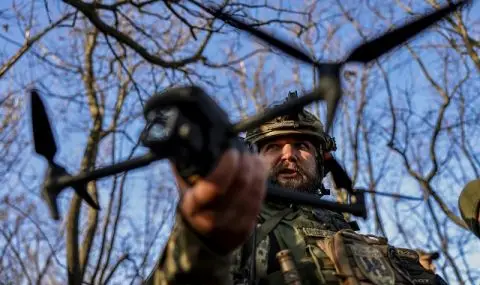On April 29, Russian Security Council Secretary Dmitry Medvedev said that the war must end with a Russian "victory" and "destruction" of the current Ukrainian government.
This is reported by the Institute for the Study of War (ISW).
Senior Kremlin officials continue to signal that Russia has greater territorial ambitions than the occupied territories of Ukraine, especially in the areas bordering the Black Sea.
Aide to the Russian President and former Secretary of the Security Council Nikolai Patrushev said in an interview with TASS published on April 29 that Ukrainian civilians, especially those living in the Black Sea region, must "determine their own future".
Patrushev specifically noted that the city of Odessa has been an outpost of the Russian Empire and the Soviet Union on the Black Sea for more than two centuries and that the residents of the city of Odessa "have nothing in common" with the current Ukrainian government.
These statements are a reference to Russian President Vladimir Putin's claim from 2023 that Ukrainians living in the Black Sea region have nothing "in common with Ukraine" and that Odessa is "a Russian city". They follow Russian Foreign Minister Sergei Lavrov's claim from 14 April 2025 that the Ukrainian government "does not represent" the residents of the city of Odessa and other Ukrainian territories.
Patrushev claims that Russia "respects the will of the Ukrainian people" and attempts to justify Russia's illegal annexation of occupied Crimea, Donbass and "Novorossiya" - a fictional region in Ukraine that the Kremlin claims includes all of eastern and southern Ukraine and is "indivisible" part of Russia.
The statements by Medvedev and Patrushev refer to the Kremlin's long-standing demand for regime change in Ukraine with a pro-Russian puppet government that could find it difficult to oppose or even support the Kremlin's goal of occupying more territory in Ukraine at a later date of the Kremlin's choosing.
Senior Russian officials have reiterated that the Ukrainian government is illegitimate, likely with the aim of reneging on any future Russian-Ukrainian agreements. Kremlin spokesman Dmitry Peskov said on April 29 that "illegitimate" The presidency of Ukrainian President Volodymyr Zelensky would create legal difficulties for direct peace talks, but Russia is more interested in starting negotiations and "everything else is secondary."
Peskov said on April 24 that Russia would resume its war if "people question Zelensky's legitimacy," and said that Russia "does not trust" the Ukrainian government.
Putin and other senior Russian officials have repeatedly claimed that all Ukrainian governments since 2014 are "illegitimate." and that Russia would not view any agreements concluded with the current Ukrainian government as binding.
Putin and other Russian officials similarly argue that Zelensky is illegitimate because Ukraine did not hold presidential elections in 2024, and further argue that all Ukrainian civilian authorities are therefore illegitimate because the president appoints regional officials.
However, the Ukrainian constitution explicitly prohibits elections during martial law and invasion by a hostile state.
The Kremlin is deliberately linking its alleged interest in Russian-Ukrainian peace talks to its false narrative of Zelensky’s illegitimateness in order to set up conditions for Russia to claim that any future peace agreement Russia signs with Zelensky is illegitimate, to renege on the agreement, and to resume the invasion at a time of Russia’s choosing. Any long-term peace agreement between Russia and Ukraine must include Russia's explicit recognition of the legitimacy of the Ukrainian government and the Ukrainian constitution.
Russian officials are setting conditions to baselessly accuse Ukraine of violating Russia's unilateral ceasefire from May 8 to 11, as the Kremlin has done during previous ceasefires, while rejecting Ukraine's proposal for a 30-day ceasefire. On April 29, Lavrov said that the ceasefire from May 8 to 11 would be "the beginning of direct negotiations, without preconditions," but said that Russia considers the 30-day ceasefire proposed by the United States and Ukraine to be a "precondition."
Lavrov reiterated his rejection of long-term ceasefires proposed by the United States and Ukraine, saying that Russia cannot accept any long-term ceasefire because such ceasefires require extensive monitoring measures. Lavrov said that Russia does not believe that "honest" monitoring is possible during a 30-day ceasefire in Ukraine. Kremlin spokesman Dmitry Peskov said on April 29 that the Ukrainian government does not have full control over all Ukrainian military units and will not be able to guarantee that Ukrainian forces will observe the May 8–11 ceasefire.
Putin has similarly announced a unilateral ceasefire for Easter in mid-April 2025, and Russia has consistently accused Ukraine of violating previous ceasefires, rarely providing evidence to support these accusations.
Ukraine - unlike Russia - has supported U.S. President Donald Trump's proposals for a 30-day temporary ceasefire or more permanent ceasefires.
Putin promoted his previously proposed Eurasian Security Architecture on April 29 as part of Russian efforts to create an alternative Russian-led bloc that would support Putin's goals of destroying NATO and weakening the West and its allies. Putin said the world must create a new security architecture, especially in Eurasia.
Putin argued that the basis of this Eurasian security architecture could be already existing organizations, such as the Union State of Russia and Belarus, the Collective Security Treaty Organization (CSTO), the Commonwealth of Independent States (CIS), the Shanghai Cooperation Organization (SCO), the BRICS, and the Association of Southeast Asian Nations (ASEAN). Patrushev similarly stated in an interview with TASS on April 29 that the "Western-centric world" is no longer useful and that the popularity of BRICS and SCO is growing.
Putin first proposed an alternative Eurasian and global security system in June 2024, reportedly with the support of Chinese President Xi Jinping.
ISW continues to assess that Russia has built a network of coalitions and partnerships to compensate for the limitations of Russian state power.
These efforts aim to make Russia's geopolitical influence more sustainable.
